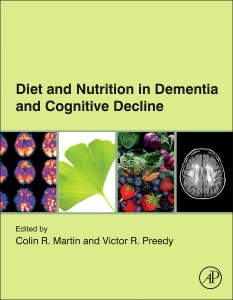Diet and Nutrition in Dementia and Cognitive Decline
Coordonnateurs : R Martin Colin, Preedy Victor R

Diet and Nutrition in Dementia and Cognitive Decline offers researchers and clinicians a single authoritative source which outlines the complex interrelationships between cognitive decline, dementia and the way diet can be modified to improve outcomes. In a cross-disciplinary field like dementia research and practice, clinicians and researchers need a comprehensive resource which will quickly help them identify a range of nutritional components and how they affect cognitive decline and the development of dementia.
While the focus is on clinical applications, the book also features landmark and innovative preclinical studies that have served as the foundation of rigorous trials. Chapters explore the evidence of how nutritional components, either in the diet or supplements, can either impede the development to, or progression from, the onset of dementia. Authors investigate how conditions and processes overlap between defined conditions and present studies which show that dietary components may be equally effective in a number of conditions characterized by declining cognition or dementia. This book represents essential reading for researchers and practicing clinicians in nutrition, dietetics, geriatrics, nursing, neurology, and psychology, as well as researchers, such as neuroscientists, molecular and cellular biochemists, interested in dementia.
http://www.acnr.co.uk/2015/07/diet-and-nutrition-in-dementia-and-cognitive-decline/
Part 1: Introductory Aspects, Specific Conditions and Basic Mechanisms in Dementia and Cognitive Decline
Part 2: General Aspects, Nutritional Factors and Specific Conditions in Dementia and Cognitive Decline
Part 3: Micronutrients in Dementia and Cognitive Decline
Part 4: Lipids, Amino Acids, Proteins and Alcohol in Dementia and Cognitive Decline
Part 5: Nutraceuticals and Dietary Components in Dementia and Cognitive Decline
Part 6: Practical Issues and Nutritional Health in Dementia and Cognitive Decline
Researchers and practicing clinicians in nutrition, dietetics, geriatrics, neurology, nursing, and psychology, as well as researchers, such as neuroscientists, molecular and cellular biochemists, interested in dementia
- Explores the complex interrelationships between cognitive decline, dementia and the way diet can be modified to improve outcomes
- Focuses on both clinical nutrition applications and the innovative preclinical studies that serve as the foundation for rigorous trials
- Covers specific conditions and mechanisms in dementias, as well as general aspects, risk factors, lifestyle and guidelines for practitioners
- Organizes chapter content in terms of the molecular, mechanistic, epidemiologic, and practical, so that correlations can be observed across conditions
Date de parution : 12-2014
Ouvrage de 1260 p.
21.4x27.6 cm
Thèmes de Diet and Nutrition in Dementia and Cognitive Decline :
Mots-clés :
1α, 25-dihydroxyvitamin D3, 25-hydroxyvitamin D, A1 receptor, A2A receptor, AMPA receptor trafficking, APOE, Acetoacetate, Acetyl-l-carnitine, Acetylcholine, Acetylcholinesterase inhibitors, Adenosine, Adiposity, Advanced dementia, Adzuki beans, Aging, Alcohol, Alcohol-related brain damage, Alcohol-related dementia, Aluminum, Alzheimer's disease, Alzheimer's, Alzheimer's disease risk, Amino acids, Amyloid β, Amyloid β-protein, Amyloid beta, Amyloid plaques, Amyloid-β, Amyloid-β (Aβ) peptides, Amyotrophic lateral sclerosis, Angelica archangelica, Animal model, Antiamyloidogenic, Antiinflammatory, Antioxidant, Antioxidant supplementation, Antioxidants, Antioxidative activity, ApoEε4, Apoptosis, Ascorbate, Astrocyte, Astrocytic plaques, Ataxia, Atrial fibrillation, Atypical Parkinson's disease, Atypical parkinsonism, Autonomy, B12 intervention, Balint syndrome, Behavioral and psychological symptoms of dementia, Behavioral variant frontotemporal dementia, Beta amyloid, Beta-amyloid, Bioaccumulators, Biomarkers, Blood-brain barrier, Body composition, Body mass index, Body weight, Brain, Brain health, Brain iron deposition, Brain microbleeds, Brain microhemorrhages, Brain-derived neuotrophic factor, Brain-derived neurotrophic factor, C9ORF72, CSF diversion, Caffeine, Caloric restriction, Cancer, Carbohydrates, Carnosinase, Carnosine, Carnosine derivatives, Carotenoids, Catalase, Catechins, Celery, Cerebral amyloidosis, Cerebrospinal fluid, Cerebrovascular disease, Cerebrovascular disorders, Chemistry, Chinese medicine, Cholesterol, Cholinergic dysfunction, Citrus, Clinical study, Clinical trials, Cobalamin, Coffee, Cognition, Cognitive, Cognitive decline, Cognitive deficits, Cognitive disturbance



